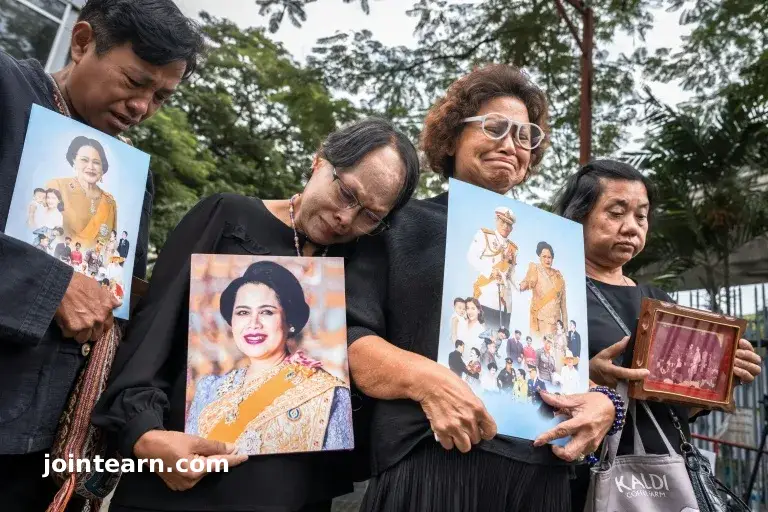
BANGKOK — Thailand is in mourning following the death of former Queen Sirikit, mother of King Maha Vajiralongkorn (Rama X) and beloved wife of the late King Bhumibol Adulyadej, who passed away late Friday at Chulalongkorn Hospital in Bangkok at the age of 93, the royal palace announced.
The loss of the long-revered matriarch, who was both a fashion icon and a symbol of maternal devotion, marks the end of a historic royal era that spanned more than six decades. Prime Minister Anutin Charnvirakul declared that the former queen’s passing was “a great loss to the nation,” and postponed his departure to the ASEAN summit in Malaysia to participate in national mourning ceremonies.
A Queen Remembered: Thailand’s Matriarch and Style Icon
Born in 1932, Queen Sirikit was crowned consort in 1950 and reigned alongside King Bhumibol for 66 years, becoming one of the most admired and photographed royals in Asia.
Often compared by Western media to Jacqueline Kennedy, Sirikit was known for her grace, elegance, and compassion, appearing on the covers of Time and Life magazines during the 1960s.
Throughout her reign, she devoted herself to rural development, education, and women’s welfare, establishing foundations that uplifted the poor and promoted Thai culture. Her impeccable fashion sense and patronage of traditional Thai silk helped project a modern yet proudly national image to the world.
“She was a mother figure to the country,” said Sasis Putthasit, a 53-year-old housekeeper in Bangkok. “I feel sad because now she’s gone.”
A Nation in Mourning
The royal palace said in a statement that Queen Sirikit had been hospitalized since 2019 due to ongoing illnesses, including a recent blood infection.
“Her Majesty’s condition worsened until Friday, and she passed away peacefully at Chulalongkorn Hospital,” the palace said.
Her son, King Vajiralongkorn, has ordered a year-long period of mourning, while Thai television anchors and public officials appeared in black attire to mark the solemn occasion.
Analyst Pavin Chachavalpongpun, a former diplomat and scholar of Thai monarchy, said her death “marks a profoundly significant event for the Thai royal family and the nation, given her immense popularity and deep connection to the late king who remains deeply revered.”
Legacy of ‘The Mother of the Nation’
Revered by millions, Queen Sirikit was affectionately known as the “Mother of the Nation.” Her birthday, August 12, became Thailand’s official Mother’s Day, reflecting her enduring role in shaping the moral and cultural identity of modern Thailand.
“She showed that she cared about Thai people the way parents love their children,” said Tanyaporn Arammetha, a store owner in Bangkok. “Even though my parents divorced, I always saw the king and queen as parental figures.”
During her public life, Sirikit often accompanied King Bhumibol on royal tours across the Thai countryside, engaging with farmers, promoting handicrafts, and supporting rural development projects that helped bridge Thailand’s economic divide.
Royal Succession and Political Context
The Chakri dynasty, which Sirikit married into in 1950, has ruled Thailand since 1782. Her husband’s reign — from 1946 to 2016 — was one of the world’s longest, guiding the country through political turbulence, economic transformation, and modernization.
The succession remains a subject of quiet speculation. King Vajiralongkorn has seven children, including his 20-year-old son Prince Dipangkorn Rasmijoti, though he has not formally named an heir.
The royal institution remains deeply respected but has faced unprecedented challenges, including youth-led pro-democracy protests in 2020 calling for reforms to the monarchy — a once-unthinkable public discourse in Thailand.
Despite these pressures, the monarchy remains central to Thai identity, and the death of Queen Sirikit is likely to rekindle nationwide displays of loyalty and affection for the royal family.
Ceremonies and Public Mourning
The palace announced that Queen Sirikit’s body will lie in state at Dusit Thorne Hall in the Grand Palace, where the public will be allowed to pay their respects.
Authorities have ordered flags to be flown at half-mast for 30 days, discouraged entertainment events, and encouraged citizens to wear black in mourning, mirroring the protocol observed after King Bhumibol’s passing in 2016.
For many Thais, her death feels like the closing of a generational chapter.
“We have lost two guiding figures — Queen Sirikit and King Bhumibol,” said Siraphob Sutthisalakorn, a food company employee. “They are watching over us from heaven.”


Leave a Reply